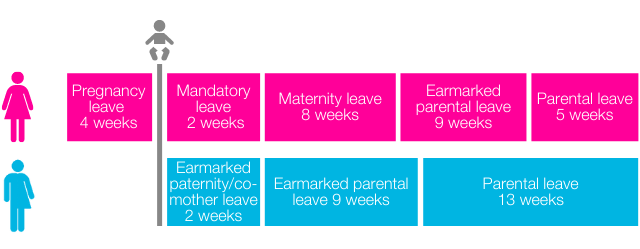New draft bill on earmarked leave for parents
Many companies are currently preparing for the coming rules on earmarked leave in connection with childbirth. This new draft bill thereby gives an additional push to the preparations, which in the long haul aims to create more equality and better flexibility at the workplace. Pursuant to the draft bill, it is proposed that the coming rules will enter into force on 1 July 2022.
This new draft bill is implementing the EU-rules on work-life balance, which includes the new rules on earmarked leave. According to the new draft bill, the rules will contribute to more equality, both at home and at the workplace, so that differences such as pay gaps and career opportunities are attempted evened out between female and male employees.
The draft bill introduces a 24-24 model, whereafter each parent from the outset is entitled to the same amount of leave after childbirth. Maternity, paternity/co-mother and parental leave will be earmarked or transferable as follows:
This new draft bill is implementing the EU-rules on work-life balance, which includes the new rules on earmarked leave. According to the new draft bill, the rules will contribute to more equality, both at home and at the workplace, so that differences such as pay gaps and career opportunities are attempted evened out between female and male employees.
The draft bill introduces a 24-24 model, whereafter each parent from the outset is entitled to the same amount of leave after childbirth. Maternity, paternity/co-mother and parental leave will be earmarked or transferable as follows:

Although the structure for taking leave is changing, the coming rules are thereby not changing the fact that parents in total are entitled to 48 weeks of leave. We have previously described the difference to the current rules, here.
Uncertainty about leave policies
There are different solutions that can be applied by companies to implement the coming rules internally. But although the draft bill offers more clarification on how maternity, paternity/co-mother, and parental leave can be taken and transferred, the draft bill does not offer any solutions.
Companies are therefore still left with uncertainty as to how the rules should be implemented without at the same time risking claims of discrimination.
IUNO’s opinion
There is a clear need for clarification of how companies lawfully can implement the coming rules without risking claims of discrimination. For many companies, it will no longer be lawful to maintain the same allocation of rights to salary during leave, as existing leave policies often will offer mothers more leave in connection with childbirth, which may present an issue.
IUNO recommends that companies begin preparing for the new rules now, and continue to follow the development closely, to ensure a clear focus on the many different aspects of the new rules. The reason is that the coming rules not only concern earmarked leave, but also takes family patterns and more into account.
We are following the development closely and will take a closer look at the rules again during our webinar on 9 March 2022 (in Danish). Read more about participation, here.
[L 104 Draft bill on amendments to the Act on Entitlement to Leave and Benefits in the Event of Childbirth of 22 December 2021]
Although the structure for taking leave is changing, the coming rules are thereby not changing the fact that parents in total are entitled to 48 weeks of leave. We have previously described the difference to the current rules, here.
Uncertainty about leave policies
There are different solutions that can be applied by companies to implement the coming rules internally. But although the draft bill offers more clarification on how maternity, paternity/co-mother, and parental leave can be taken and transferred, the draft bill does not offer any solutions.
Companies are therefore still left with uncertainty as to how the rules should be implemented without at the same time risking claims of discrimination.
IUNO’s opinion
There is a clear need for clarification of how companies lawfully can implement the coming rules without risking claims of discrimination. For many companies, it will no longer be lawful to maintain the same allocation of rights to salary during leave, as existing leave policies often will offer mothers more leave in connection with childbirth, which may present an issue.
IUNO recommends that companies begin preparing for the new rules now, and continue to follow the development closely, to ensure a clear focus on the many different aspects of the new rules. The reason is that the coming rules not only concern earmarked leave, but also takes family patterns and more into account.
We are following the development closely and will take a closer look at the rules again during our webinar on 9 March 2022 (in Danish). Read more about participation, here.
[L 104 Draft bill on amendments to the Act on Entitlement to Leave and Benefits in the Event of Childbirth of 22 December 2021]
Similar
The team

Alexandra
Jensen
Legal advisor
Anders
Etgen Reitz
Partner
Caroline
Thorsen
Junior legal assistant
Cecillie
Groth Henriksen
Senior associate
Johan
Gustav Dein
Associate
Julie
Meyer
Senior legal assistant
Kirsten
Astrup
Managing associate (on leave)
Maria
Kjærsgaard Juhl
Legal advisor
Sofie
Aurora Braut Bache
Managing associate